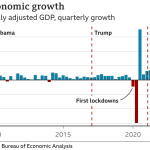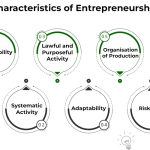Gina Raimondo, a prominent figure in American politics, has made waves as both a U.S. Commerce Secretary and the Governor of Rhode Island. Her tenure has been marked by groundbreaking policies aimed at boosting economic competitiveness, especially during her role in the Biden administration. Known for her decisive leadership, she played a pivotal role in implementing the Infrastructure Investment and Jobs Act, which has been crucial for revitalizing infrastructure across the nation. Under her guidance, key initiatives focused on making systemic changes that foster inclusivity and opportunity for all Americans. Raimondo’s commitment to reform has propelled her into the spotlight, illustrating her belief that in order to break the mold and foster innovation, changes—however challenging—are necessary for progress.
As a leader in economic policy, Gina Raimondo has not only redefined her state’s governing approach but has also significantly influenced national strategies. Her efforts during the Biden era, particularly with the Infrastructure Investment and Jobs Act, demonstrate a larger commitment to enhancing America’s economic framework. By advocating for initiatives that promote economic equality, she reflects a profound understanding of the needs of everyday citizens, while simultaneously addressing the competitive landscape on a global stage. The initiatives she championed signal a shift towards a more sustainable and responsible method of governance, emphasizing the importance of infrastructure in driving economic growth and job creation. Raimondo’s journey underscores the impact that visionary leadership can have on reshaping policies for the betterment of society.
Gina Raimondo: A Visionary Leader for Economic Change
Gina Raimondo has showcased her commitment to economic competitiveness throughout her career. As both the former U.S. Commerce Secretary and the Rhode Island governor, she has actively worked to implement reforms that encourage investment and growth. One of her notable actions was cutting taxes consistently during her tenure, which contributed to spurring local businesses and attracting new investments. This approach aligns with her overarching goal of ensuring that economic opportunities are available to everyone, particularly vulnerable populations who have historically been left behind in economic discussions.
Under her leadership, the Biden administration’s Infrastructure Investment and Jobs Act stands as a testament to her focus on modernizing the U.S. economy. By promoting infrastructure improvements and job creation, the act not only aims to revitalize aging systems but also equips workers with the necessary skills for the future job market. Raimondo’s dedication to such initiatives reflects her understanding that a robust economy is built on the foundation of strong infrastructure and access to education.
Transforming Challenges into Opportunities
Gina Raimondo often emphasizes that making progress can sometimes mean disrupting the status quo. She acknowledges that change involves breaking outdated systems that no longer serve the people effectively. This philosophy was evident during her time in office, where she was unafraid to challenge entrenched interests and push for policies such as minimum wage increases and free community college tuition for residents. By implementing these measures, she demonstrated how proactive governance can lead to tangible benefits for the average American.
Her proactive approach during crises, such as the COVID-19 pandemic, showcases her strategic vision. Raimondo’s efforts to streamline supply chains and reinforce essential industries not only provided immediate relief but also strengthened the resilience of the economy. As she stated, successful governance requires an understanding of the complexities involved, and her administration exemplified the importance of adaptability in promoting economic stability.
Biden Administration’s Comprehensive Economic Strategies
Within the framework of the Biden administration, Gina Raimondo played a crucial role in shaping policies that were aimed at revitalizing the U.S. economy. The Infrastructure Investment and Jobs Act is a key part of this strategy, as it encompasses significant investments in renewable energy, transportation infrastructure, and technological innovation. These initiatives are designed to enhance economic competitiveness domestically and position the U.S. favorably in the global economy, particularly as other nations rapidly advance their technological capacities.
The CHIPs and Science Act, which seeks to bolster domestic semiconductor production, highlights Raimondo’s proactive stance on national security and economic self-reliance. By advocating for local production of critical components, such as semiconductors, she recognizes the importance of securing essential supply chains from international disruptions. This foresight not only addresses immediate needs but also builds a framework for long-term economic stability.
Balancing Social Equity with Economic Growth
Raimondo understands that true economic growth cannot come at the expense of social equity. During her tenure, she emphasized the integration of social programs with economic initiatives. She argued that any substantial economic plan must address the needs of all citizens, particularly those who have been historically marginalized. By encouraging businesses to adopt policies that support workers, such as childcare programs, her administration sought to build a more inclusive workforce.
This approach is manifestly evident in how tax incentives were structured for companies receiving state funding. Raimondo ensured that such incentives were contingent on those companies creating inclusive workplace policies. This not only nurtured a diverse labor market but directly contributed to economic competitiveness by maximizing the potential of all segments of the population.
The Legacy of Reform in Rhode Island
Gina Raimondo’s legacy as Rhode Island’s governor includes a series of reforms that transformed the state’s economy. Her commitment to reducing regulations and cutting taxes not only positioned the state for growth but also fostered an entrepreneurial spirit among its residents. By concentrating on improving the business environment, she laid the groundwork for attracting investments and boosting economic activity.
Moreover, her push for accessible education through community college initiatives exemplified her belief in empowering citizens with the skills needed for today’s labor market. By eliminating barriers to higher education, Raimondo facilitated pathways for thousands of Rhode Islanders to acquire essential skills and improve their employability, reinforcing her commitment to economic inclusivity.
Insights on Supply Chain Resilience
In her role as U.S. Commerce Secretary, Gina Raimondo confronted the challenges posed by weakened supply chains during the pandemic. Her strategic focus on understanding supply chain complexities allowed her to address critical shortages effectively. By building alliances with countries such as Indonesia and the Philippines, she demonstrated the importance of international partnerships in ensuring economic stability and resilience.
Raimondo’s proactive measures in creating detailed analyses of supply chains underscore her commitment to long-term solutions. By establishing a strong framework for collaboration among key stakeholders, she aimed to reinforce American supply chains against future disruptions. This approach not only pertains to immediate needs but also nurtures a culture of adaptability and innovation in the U.S. economy.
Advocating for Fair Trade Practices
Throughout her career, Gina Raimondo has been a staunch advocate for fair trade practices, particularly in the context of international competition. Recognizing the challenges posed by countries like China, which often do not follow fair trade rules, she has championed policies that promote reciprocity in trade agreements. Her advocacy is rooted in the belief that fair competition strengthens domestic industries and protects American workers.
By calling for reforms that level the playing field, Raimondo emphasizes the necessity of maintaining a fair market environment. This perspective is crucial in fostering economic competitiveness and ensuring that U.S. manufacturers can thrive in an increasingly globalized economy, without being undermined by unfair practices.
Gina Raimondo’s Vision for American Innovation
Gina Raimondo has consistently championed the need for innovation as a cornerstone of economic growth. Her tenure saw a significant emphasis on fostering technological advancements and supporting startups. Through government initiatives aimed at incentivizing research and development, she aimed to position the U.S. as a leader in technological innovation, crucial for maintaining economic competitiveness.
Moreover, her recognition of the role that knowledge-based industries play in the economy reflects her understanding of contemporary economic dynamics. By advocating for investments in education and resources to support innovation, Raimondo ensures that the next generation is prepared to meet the challenges of a rapidly changing job market.
Challenges and Criticisms: Reflections from Raimondo’s Tenure
Despite considerable successes during her time in office, Gina Raimondo has also faced criticisms related to her decisions and compromises. Navigating a closely divided Congress presented significant challenges, making it difficult to pass ambitious reforms without some concessions. Raimondo has acknowledged that while many initiatives were effective, the complexity of politics sometimes necessitated compromises that may not have aligned with every constituent’s expectations.
In reflecting on her tenure, she emphasizes that achieving meaningful change is often a complex process fraught with challenges. By confronting these criticisms head-on, she not only upholds her commitment to accountability but also highlights the realities of contemporary governance. Her willingness to engage in this discourse reflects a dedication to continuing the pursuit of effective and equitable policies.
Frequently Asked Questions
What initiatives did Gina Raimondo implement as Rhode Island’s governor to improve economic competitiveness?
As the Rhode Island governor, Gina Raimondo focused on enhancing economic competitiveness by cutting taxes annually, raising the state minimum wage, and making community college tuition-free. She also streamlined regulations by eliminating 30% of them, aiming to create a more favorable environment for businesses and residents.
How did Gina Raimondo contribute to the Biden administration’s Infrastructure Investment and Jobs Act?
Gina Raimondo played a crucial role in shaping the Biden administration’s Infrastructure Investment and Jobs Act by advocating for funding that supports critical infrastructure projects. Her emphasis was on ensuring fair opportunities for everyday Americans and boosting economic competitiveness through strategic investments.
What challenges did Gina Raimondo face as U.S. Commerce Secretary during the COVID pandemic?
As U.S. Commerce Secretary, Gina Raimondo confronted challenges like disrupted supply chains due to COVID-19. She developed critical supply chain assessments and fostered international partnerships to address shortages, emphasizing the importance of collaboration with other nations under President Biden’s leadership.
How did Gina Raimondo address the semiconductor shortage in her role as Commerce Secretary?
Gina Raimondo addressed the semiconductor shortage by supporting the CHIPs and Science Act, which aims to boost domestic production of essential chips. She highlighted the national security implications of relying on foreign supplies and the importance of increasing domestic manufacturing for cutting-edge technology.
What lessons did Gina Raimondo learn from her experience in the Biden administration regarding economic policies?
From her experience in the Biden administration, Gina Raimondo learned that achieving significant economic policies in a divided government often requires compromise and collaboration, even though it may lead to critiques. She stressed the importance of balancing economic initiatives with social programs to strengthen the labor market.
What is Gina Raimondo’s perspective on free trade and competition with China?
Gina Raimondo believes that free trade is beneficial when all parties adhere to fair rules. She has been vocal about China’s noncompliance with trade regulations, advocating for more reciprocity in trade practices to ensure a level playing field for U.S. businesses.
| Key Point | Details |
|---|---|
| Positive Change Requires Change | Gina Raimondo emphasizes that improving situations often requires breaking existing norms, such as cutting taxes and eliminating regulations. |
| Fairness and Opportunity | Raimondo’s political motivation stems from her family’s immigrant background and the desire to advocate for everyday Americans. |
| Collaboration in Policy | Raimondo highlights the importance of international partnerships in strengthening supply chains and US competitiveness. |
| CHIPs and Science Act | Focuses on manufacturing essential technology domestically, especially critical chips for AI and national security. |
| Fiscal Responsibility | For each dollar invested, $10 in private funding was leveraged, illustrating commitment to economic sustainability. |
| Stance on Free Trade | Critiques China’s trade practices and advocates for fair trade rules and reciprocity. |
| Reflection on Political Challenges | Acknowledges compromises made during her tenure but affirms the significance of successes amid a divided political landscape. |
| COVID-19 Response | Discusses the massive unemployment surge and the need for substantial stimulus to support recovery. |
| Integration of Social Programs | Links childcare support to workforce participation as a crucial strategy for economic recovery. |
Summary
Gina Raimondo highlights the necessity of change to improve economic conditions, advocating for fairness and opportunity. Throughout her political career, she has emphasized the importance of collaboration and fiscal responsibility in shaping effective policy. Her strategic initiatives showcase a commitment to both innovation and inclusivity, addressing challenges faced by everyday Americans while navigating the complexities of governance. By intertwining social programs with economic policies, Raimondo aims to create a sustainable framework for growth and recovery, demonstrating her adeptness at leading through tumultuous times.









